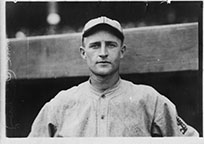- Over Ten Games Behind
- Players and Club Officials Say Team Is Just Rounding to Best Form, While Rival Outfits Are Beginning to Wilt – Pitching Staff Strong.
- Doak Top Pitcher On Cards
July 14, 1914 Age 23
By W. J. O’Connor. St Louis Post Dispatch
ONLY EIGHT teams in the National League still inwardly cherish the hope of winning this year’s pennant. The last to file claim on the grand old rag is Boston, at present a tenant in the cellar of the Tener baseball plant. Boston today is 10 1/2 games out of first place and the race has just reached the half-way mark.
“We do not consider ourselves entirely out of the pennant hunt,” declared Herman Nickerson, secretary of the Boston club, Tuesday, “because we are just hitting our stride while other clubs are hitting the toboggan. We are, of course, 10 lengths behind, but we have won five out of six games on this trip and with our pitchers going as they are, I look for a great record in the west. It is possible that we will return home only five games out of the lead, which mean that we will be very much in the race.
Nickerson is sincere, although not bold in his statement. He declares that it is not at all improbable that the Braves will hit a long winning streak. He points to the long slump which his club had In April and May and says the club is just stepping out with the proper stride.
Nothing Impossible, Now.
A winning streak of 10 games would put his club right up there and because of the shaky condition of the old National League, such a feat is not at all improbable.
Stallings’ men are playing gingery ball. He has a great assortment of pitchers in Rudolph, Tyler, James, Crutcher and Hess. Had he kept Jack Quinn, now with the Baltimore Feds, Stallings earnestly believes his club would be in the thick of the fight.
But it is not the pitchers who are making the Boston club. It’s that pair around second base, the smallest and most troublesome duet in either League – John Evers and Rabbit Maranville.
There’s the keynote of Stallings’ success. They’re the fastest keystone combination in either League and have put through, so far, more double plays than any combination working around second base in either big League. Maranville is in a class by himself as a fielder – fast as a streak and possessed of a great arm. Evers has the arm, the knack of outguessing the enemy and he plays a defensive game totally different from any other N. L. second baseman.
In Monday’s fray Evers frequently stationed himself almost back of second base. He then pulled Big Schmidt far over from first and threw a defense around second that was tighter than the proverbial kettle drum. Evers, who is Stallings’ captain, so maneuvers the Braves’ infield that it is almost impossible to get a single on a ground ball. He swings the infield to the right and makes the pitcher put the ball where it can be hit only in the direction of the Braves’ strongest defense. What chance has a slow man?
Braves’ Infield Tight.
In their games here this season the Braves have shown a tighter inner defense than any other team – even the Giants. The persistency with which Evers and Maranville have cut down hits and the ground that this pair covers has been a revelation.
But the Braves’ outfield and catching departments are not in keeping with the infield and for that reason many tight games have been lost. The acquisition of Devore and the improved playing of Connolly has rounded out a fairly good outfield, at this date, and the Braves figure to win more games than they lose between now and October.
The pennant hunch Is a little overdrawn, of course, but the fans had better make up their mind that Boston is a strong applicant for first division honors and to defeat their plans the Cards will have to buckle down to serious business.
Give the Cardinals Mr. Maranville, however, and McGraw’s chances for a fourth pennant would be a 1 to 3 shot.
Local Clubs Prosper.
AT best it can be but a lean year all around; one of the few exceptions to this statement promises to be right here in St. Louis, where the success of the teams has reawakened an interest well nigh dead. Owners Britton and Hedges will make money, this year, although both have been put in the vice and squeezed by the financially insatiable players.
In normal times a break like the Cardinals are getting would have been a great coin-getter. Britton’s new club cost him little to Improve, not over $6000. Willie Doak, the best pitcher the team has, at present, came for a song less than $1000. Snyder was acquired for a few hundreds; Miller, Dolan and Wilson, three important factors, were obtained in trade as was Hub Perdue, a pitcher who should prove a factor. On straight purchase money it did not cost Britton $5000 to build a third-place team out of a tail-ender, in one season!
